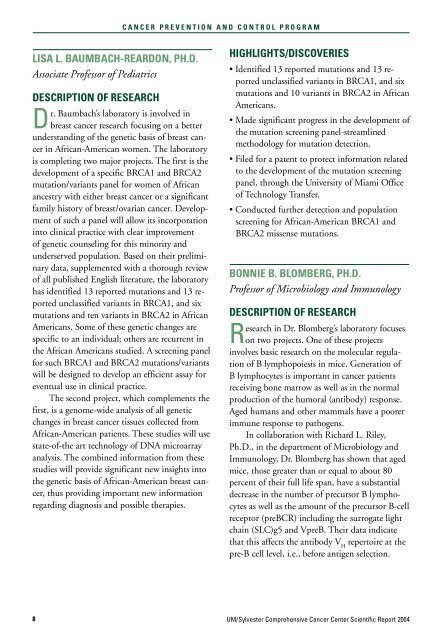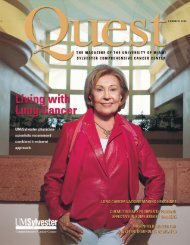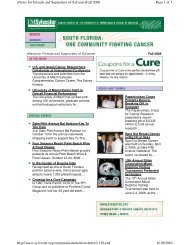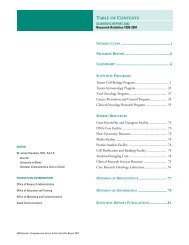SCIENTIFIC REPORT 2004 - Sylvester Comprehensive Cancer Center
SCIENTIFIC REPORT 2004 - Sylvester Comprehensive Cancer Center
SCIENTIFIC REPORT 2004 - Sylvester Comprehensive Cancer Center
You also want an ePaper? Increase the reach of your titles
YUMPU automatically turns print PDFs into web optimized ePapers that Google loves.
C A N C E R P R E V E N T I O N A N D C O N T R O L P R O G R A M<br />
LISA L. BAUMBACH-REARDON, PH.D.<br />
Associate Professor of Pediatrics<br />
DESCRIPTION OF RESEARCH<br />
Dr. Baumbach’s laboratory is involved in<br />
breast cancer research focusing on a better<br />
understanding of the genetic basis of breast cancer<br />
in African-American women. The laboratory<br />
is completing two major projects. The first is the<br />
development of a specific BRCA1 and BRCA2<br />
mutation/variants panel for women of African<br />
ancestry with either breast cancer or a significant<br />
family history of breast/ovarian cancer. Development<br />
of such a panel will allow its incorporation<br />
into clinical practice with clear improvement<br />
of genetic counseling for this minority and<br />
underserved population. Based on their preliminary<br />
data, supplemented with a thorough review<br />
of all published English literature, the laboratory<br />
has identified 13 reported mutations and 13 reported<br />
unclassified variants in BRCA1, and six<br />
mutations and ten variants in BRCA2 in African<br />
Americans. Some of these genetic changes are<br />
specific to an individual; others are recurrent in<br />
the African Americans studied. A screening panel<br />
for such BRCA1 and BRCA2 mutations/variants<br />
will be designed to develop an efficient assay for<br />
eventual use in clinical practice.<br />
The second project, which complements the<br />
first, is a genome-wide analysis of all genetic<br />
changes in breast cancer tissues collected from<br />
African-American patients. These studies will use<br />
state-of-the art technology of DNA microarray<br />
analysis. The combined information from these<br />
studies will provide significant new insights into<br />
the genetic basis of African-American breast cancer,<br />
thus providing important new information<br />
regarding diagnosis and possible therapies.<br />
HIGHLIGHTS/DISCOVERIES<br />
• Identified 13 reported mutations and 13 reported<br />
unclassified variants in BRCA1, and six<br />
mutations and 10 variants in BRCA2 in African<br />
Americans.<br />
• Made significant progress in the development of<br />
the mutation screening panel-streamlined<br />
methodology for mutation detection.<br />
• Filed for a patent to protect information related<br />
to the development of the mutation screening<br />
panel, through the University of Miami Office<br />
of Technology Transfer.<br />
• Conducted further detection and population<br />
screening for African-American BRCA1 and<br />
BRCA2 missense mutations.<br />
BONNIE B. BLOMBERG, PH.D.<br />
Professor of Microbiology and Immunology<br />
DESCRIPTION OF RESEARCH<br />
Research in Dr. Blomberg’s laboratory focuses<br />
on two projects. One of these projects<br />
involves basic research on the molecular regulation<br />
of B lymphopoiesis in mice. Generation of<br />
B lymphocytes is important in cancer patients<br />
receiving bone marrow as well as in the normal<br />
production of the humoral (antibody) response.<br />
Aged humans and other mammals have a poorer<br />
immune response to pathogens.<br />
In collaboration with Richard L. Riley,<br />
Ph.D., in the department of Microbiology and<br />
Immunology, Dr. Blomberg has shown that aged<br />
mice, those greater than or equal to about 80<br />
percent of their full life span, have a substantial<br />
decrease in the number of precursor B lymphocytes<br />
as well as the amount of the precursor B-cell<br />
receptor (preBCR) including the surrogate light<br />
chain (SLC)g5 and VpreB. Their data indicate<br />
that this affects the antibody V H<br />
repertoire at the<br />
pre-B cell level, i.e., before antigen selection.<br />
8<br />
UM/<strong>Sylvester</strong> <strong>Comprehensive</strong> <strong>Cancer</strong> <strong>Center</strong> Scientific Report <strong>2004</strong>
















